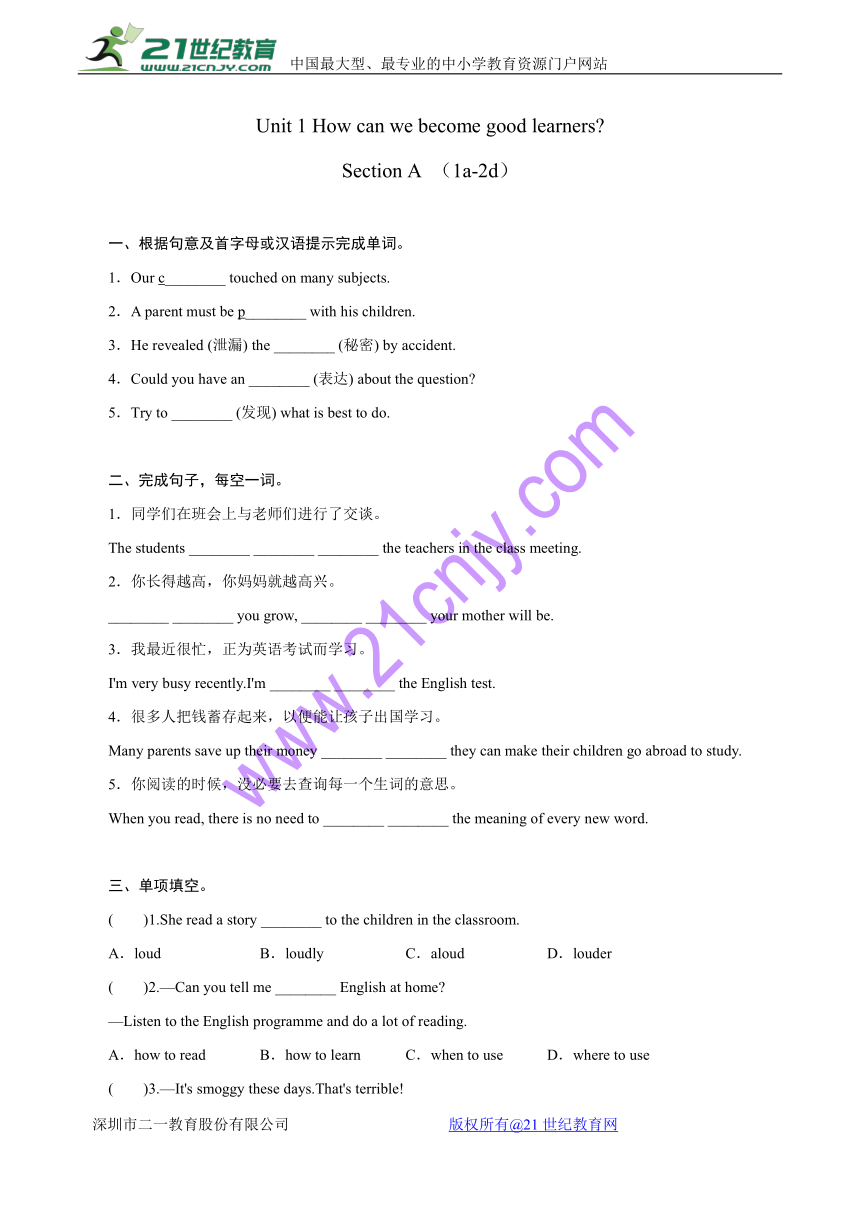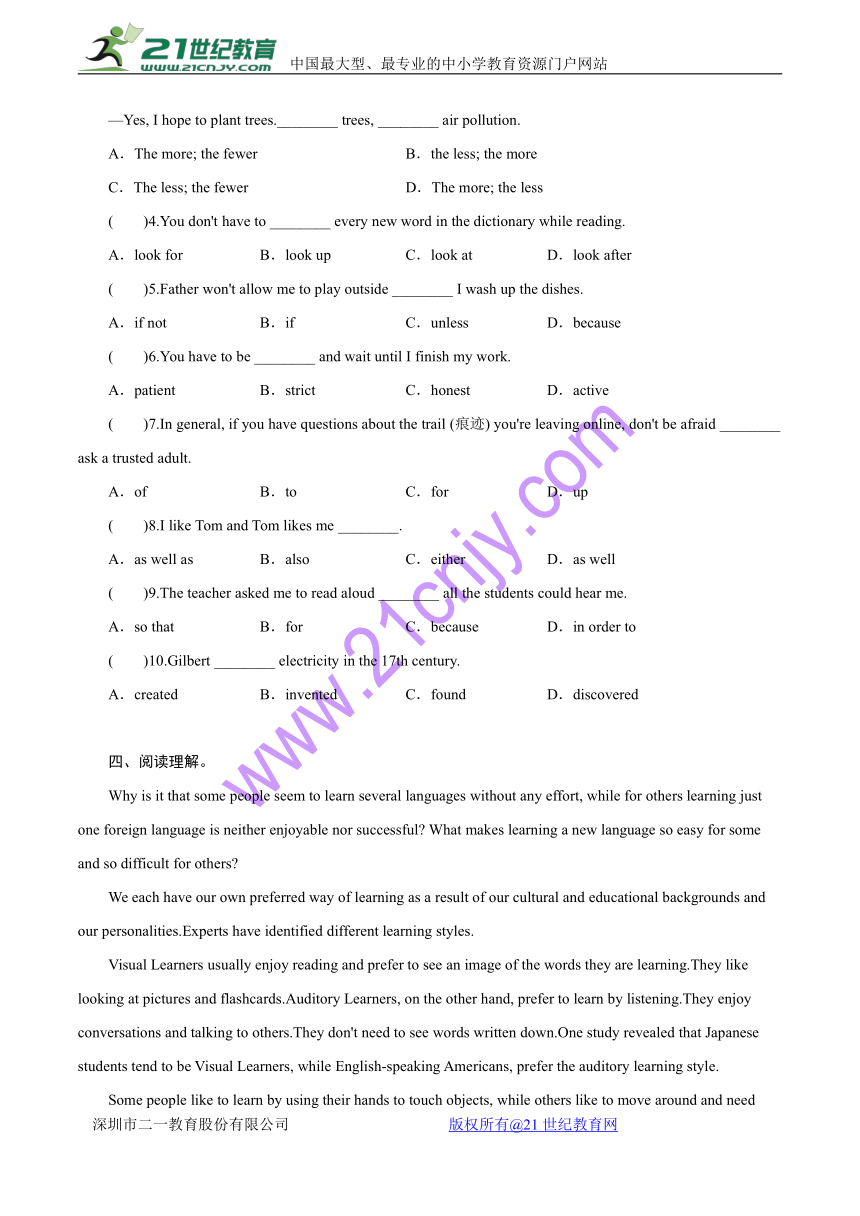【优选整合】人教版九年级上册英语 unit1 第1课时(Section A 1a-2d)测试
文档属性
| 名称 | 【优选整合】人教版九年级上册英语 unit1 第1课时(Section A 1a-2d)测试 |  | |
| 格式 | zip | ||
| 文件大小 | 123.2KB | ||
| 资源类型 | 教案 | ||
| 版本资源 | 人教新目标(Go for it)版 | ||
| 科目 | 英语 | ||
| 更新时间 | 2018-02-12 16:45:40 | ||
图片预览


文档简介
Unit 1 How can we become good learners?
Section A (1a-2d)
一、根据句意及首字母或汉语提示完成单词。
1.Our c________ touched on many subjects.
2.A parent must be p________ with his children.
3.He revealed (泄漏) the ________ (秘密) by accident.
4.Could you have an ________ (表达) about the question?21*cnjy*com
5.Try to ________ (发现) what is best to do.
二、完成句子,每空一词。
1.同学们在班会上与老师们进行了交谈。
The students ________ ________ ________ the teachers in the class meeting.【来源:21cnj*y.co*m】
2.你长得越高,你妈妈就越高兴。
________ ________ you grow, ________ ________ your mother will be.【出处:21教育名师】
3.我最近很忙,正为英语考试而学习。
I'm very busy recently.I'm ________ ________ the English test.21*cnjy*com
4.很多人把钱蓄存起来,以便能让孩子出国学习。
Many parents save up their money ________ ________ they can make their children go abroad to study.
5.你阅读的时候,没必要去查询每一个生词的意思。
When you read, there is no need to ________ ________ the meaning of every new word.
三、单项填空。
( )1.She read a story ________ to the children in the classroom.21·世纪*教育网
A.loud B.loudly C.aloud D.louder
( )2.—Can you tell me ________ English at home?
—Listen to the English programme and do a lot of reading.www.21-cn-jy.com
A.how to read B.how to learn C.when to use D.where to use
( )3.—It's smoggy these days.That's terrible!
—Yes, I hope to plant trees.________ trees, ________ air pollution.
A.The more; the fewer B.the less; the more
C.The less; the fewer D.The more; the less
( )4.You don't have to ________ every new word in the dictionary while reading.2·1·c·n·j·y
A.look for B.look up C.look at D.look after
( )5.Father won't allow me to play outside ________ I wash up the dishes.
A.if not B.if C.unless D.because
( )6.You have to be ________ and wait until I finish my work.21cnjy.com
A.patient B.strict C.honest D.active
( )7.In general, if you have questions about the trail (痕迹) you're leaving online, don't be afraid ________ ask a trusted adult.21教育名师原创作品
A.of B.to C.for D.up
( )8.I like Tom and Tom likes me ________.
A.as well as B.also C.either D.as well
( )9.The teacher asked me to read aloud ________ all the students could hear me.
A.so that B.for C.because D.in order to
( )10.Gilbert ________ electricity in the 17th century.
A.created B.invented C.found D.discovered
四、阅读理解。
Why is it that some people seem to learn several languages without any effort, while for others learning just one foreign language is neither enjoyable nor successful? What makes learning a new language so easy for some and so difficult for others?【版权所有:21教育】
We each have our own preferred way of learning as a result of our cultural and educational backgrounds and our personalities.Experts have identified different learning styles.
Visual Learners usually enjoy reading and prefer to see an image of the words they are learning.They like looking at pictures and flashcards.Auditory Learners, on the other hand, prefer to learn by listening.They enjoy conversations and talking to others.They don't need to see words written down.One study revealed that Japanese students tend to be Visual Learners, while English-speaking Americans, prefer the auditory learning style.
Some people like to learn by using their hands to touch objects, while others like to move around and need frequent breaks from sitting at a desk.2-1-c-n-j-y
There are Analytical Learners, meaning they enjoy understanding how the language works.They love studying grammar rules and like to focus on details, whereas Global Learners are more interested in communicating their ideas and are not worried about whether what they say is grammatically correct.www-2-1-cnjy-com
In spoken English, the Japanese tend to be Reflective Learners.They think carefully before they speak to ensure their message is accurate.They do not make so many mistakes but their communication is slower.European learners tend to be mote Impulsive Learners.They speak more fluently and worry about how well they are communicating rather than how many mistakes they are making.
So, to do well in a language, you should identify your style and try to find a class that will teach you the way you want to learn.For example, if you are a Reflective Learner, you may not do so well in a purely conversational class and as an Auditory Learner, you probably don't want to do so much reading.In fact if you are an Auditory Learner, you are probably not enjoying yourself right now!
( )1.The passage mainly talks about ______.
A.the difficult learning styles of some people
B.the easy learning ways of other people
C.the different learning styles of the Japanese
D.the different learning methods of all the people21教育网
( )2.Which of the following phrases isn't connected with the learning style?
A.The way people are taught to learn a language.
B.The place where people are from.
C.The size of people.
D.The kind of person people are.
( )3.Visual Learners like to ______.
A.see things B.touch things C.hear things D.do things21世纪教育网版权所有
( )4.Auditory Learners like to ______.
A.hear things B.buy things C.destroy things D.paint things
( )5.Analytical Learners ______.
A.are similar to Global Learners B.never worry about mistakes【来源:21·世纪·教育·网】
C.love to study details D.do well in conversation
参考答案:
一、1.conversation 2.patient 3.secret 4.expression 5.discover
二、1.had conversations with 2.The taller; the happier
3.studying for 4.so that 5.look up
三、1.C aloud做副词,强调“出声”,主要与read, think等连用,故选C。
2.B 由答语可知问句是询问学习英语的方法,故只有B项符合语境。
3.D 由语境及常识可知,雾霾天气太糟糕了,树越多,空气污染就会越少。air pollution是不可数名词,不能用fewer修饰,故选D。
4.B 由句意“阅读时没必要用词典查询每个生词”可知选B。look up意为“查找”。
5.C 前半句是否定句,而后半句是肯定句,前后句之间存在着逻辑上的转折关系,故B、D两项可排除;if not明显不符合语境。故选C。21·cn·jy·com
6.A 句意:你得耐心等到我完成工作为止。由句意可知应选A。
7.B be afraid to意为“害怕……”,to是动词不定式符号,后面接动词原形。
8.D 本句是肯定句且空格在句末,说明是用as well。
9.A 句意:老师叫我读大声一点,这样的话,所有的学生都可以听得到。该句是一个结果状语从句,故排除B、C两项;D项in order to不能引导从句。so that意为“以便;为了”,故选A。
10.D 句意:在17世纪,吉尔伯特发现了电。discover指发现原来存在的事物,故选D。
四、1—5 DCAAC
Section A (1a-2d)
一、根据句意及首字母或汉语提示完成单词。
1.Our c________ touched on many subjects.
2.A parent must be p________ with his children.
3.He revealed (泄漏) the ________ (秘密) by accident.
4.Could you have an ________ (表达) about the question?21*cnjy*com
5.Try to ________ (发现) what is best to do.
二、完成句子,每空一词。
1.同学们在班会上与老师们进行了交谈。
The students ________ ________ ________ the teachers in the class meeting.【来源:21cnj*y.co*m】
2.你长得越高,你妈妈就越高兴。
________ ________ you grow, ________ ________ your mother will be.【出处:21教育名师】
3.我最近很忙,正为英语考试而学习。
I'm very busy recently.I'm ________ ________ the English test.21*cnjy*com
4.很多人把钱蓄存起来,以便能让孩子出国学习。
Many parents save up their money ________ ________ they can make their children go abroad to study.
5.你阅读的时候,没必要去查询每一个生词的意思。
When you read, there is no need to ________ ________ the meaning of every new word.
三、单项填空。
( )1.She read a story ________ to the children in the classroom.21·世纪*教育网
A.loud B.loudly C.aloud D.louder
( )2.—Can you tell me ________ English at home?
—Listen to the English programme and do a lot of reading.www.21-cn-jy.com
A.how to read B.how to learn C.when to use D.where to use
( )3.—It's smoggy these days.That's terrible!
—Yes, I hope to plant trees.________ trees, ________ air pollution.
A.The more; the fewer B.the less; the more
C.The less; the fewer D.The more; the less
( )4.You don't have to ________ every new word in the dictionary while reading.2·1·c·n·j·y
A.look for B.look up C.look at D.look after
( )5.Father won't allow me to play outside ________ I wash up the dishes.
A.if not B.if C.unless D.because
( )6.You have to be ________ and wait until I finish my work.21cnjy.com
A.patient B.strict C.honest D.active
( )7.In general, if you have questions about the trail (痕迹) you're leaving online, don't be afraid ________ ask a trusted adult.21教育名师原创作品
A.of B.to C.for D.up
( )8.I like Tom and Tom likes me ________.
A.as well as B.also C.either D.as well
( )9.The teacher asked me to read aloud ________ all the students could hear me.
A.so that B.for C.because D.in order to
( )10.Gilbert ________ electricity in the 17th century.
A.created B.invented C.found D.discovered
四、阅读理解。
Why is it that some people seem to learn several languages without any effort, while for others learning just one foreign language is neither enjoyable nor successful? What makes learning a new language so easy for some and so difficult for others?【版权所有:21教育】
We each have our own preferred way of learning as a result of our cultural and educational backgrounds and our personalities.Experts have identified different learning styles.
Visual Learners usually enjoy reading and prefer to see an image of the words they are learning.They like looking at pictures and flashcards.Auditory Learners, on the other hand, prefer to learn by listening.They enjoy conversations and talking to others.They don't need to see words written down.One study revealed that Japanese students tend to be Visual Learners, while English-speaking Americans, prefer the auditory learning style.
Some people like to learn by using their hands to touch objects, while others like to move around and need frequent breaks from sitting at a desk.2-1-c-n-j-y
There are Analytical Learners, meaning they enjoy understanding how the language works.They love studying grammar rules and like to focus on details, whereas Global Learners are more interested in communicating their ideas and are not worried about whether what they say is grammatically correct.www-2-1-cnjy-com
In spoken English, the Japanese tend to be Reflective Learners.They think carefully before they speak to ensure their message is accurate.They do not make so many mistakes but their communication is slower.European learners tend to be mote Impulsive Learners.They speak more fluently and worry about how well they are communicating rather than how many mistakes they are making.
So, to do well in a language, you should identify your style and try to find a class that will teach you the way you want to learn.For example, if you are a Reflective Learner, you may not do so well in a purely conversational class and as an Auditory Learner, you probably don't want to do so much reading.In fact if you are an Auditory Learner, you are probably not enjoying yourself right now!
( )1.The passage mainly talks about ______.
A.the difficult learning styles of some people
B.the easy learning ways of other people
C.the different learning styles of the Japanese
D.the different learning methods of all the people21教育网
( )2.Which of the following phrases isn't connected with the learning style?
A.The way people are taught to learn a language.
B.The place where people are from.
C.The size of people.
D.The kind of person people are.
( )3.Visual Learners like to ______.
A.see things B.touch things C.hear things D.do things21世纪教育网版权所有
( )4.Auditory Learners like to ______.
A.hear things B.buy things C.destroy things D.paint things
( )5.Analytical Learners ______.
A.are similar to Global Learners B.never worry about mistakes【来源:21·世纪·教育·网】
C.love to study details D.do well in conversation
参考答案:
一、1.conversation 2.patient 3.secret 4.expression 5.discover
二、1.had conversations with 2.The taller; the happier
3.studying for 4.so that 5.look up
三、1.C aloud做副词,强调“出声”,主要与read, think等连用,故选C。
2.B 由答语可知问句是询问学习英语的方法,故只有B项符合语境。
3.D 由语境及常识可知,雾霾天气太糟糕了,树越多,空气污染就会越少。air pollution是不可数名词,不能用fewer修饰,故选D。
4.B 由句意“阅读时没必要用词典查询每个生词”可知选B。look up意为“查找”。
5.C 前半句是否定句,而后半句是肯定句,前后句之间存在着逻辑上的转折关系,故B、D两项可排除;if not明显不符合语境。故选C。21·cn·jy·com
6.A 句意:你得耐心等到我完成工作为止。由句意可知应选A。
7.B be afraid to意为“害怕……”,to是动词不定式符号,后面接动词原形。
8.D 本句是肯定句且空格在句末,说明是用as well。
9.A 句意:老师叫我读大声一点,这样的话,所有的学生都可以听得到。该句是一个结果状语从句,故排除B、C两项;D项in order to不能引导从句。so that意为“以便;为了”,故选A。
10.D 句意:在17世纪,吉尔伯特发现了电。discover指发现原来存在的事物,故选D。
四、1—5 DCAAC
同课章节目录
- Unit 1 How can we become good learners.
- Section A
- Section B
- Unit 2 I think that mooncakes are delicious!
- Section A
- Section B
- Unit 3 Could you please tell me where the restroom
- Section A
- Section B
- Unit 4 I used to be afraid of the dark.
- Section A
- Section B
- Unit 5 What are the shirts made of?
- Section A
- Section B
- Review of Units 1-5
- Unit 6 When was it invented?
- Section A
- Section B
- Unit 7 Teenagers should be allowed to choose their
- Section A
- Section B
- Unit 8 It must belong to Carla.
- Section A
- Section B
- Unit 9 I like music that I can dance to.
- Section A
- Section B
- Unit 10 You're supposed to shake hands.
- Section A
- Section B
- Review of Units 6-10
- Unit 11 Sad movies make me cry.
- Section A
- Section B
- Unit 12 Life is full of the unexpected
- Section A
- Section B
- Unit 13 We're trying to save the earth!
- Section A
- Section B
- Unit 14 I remember meeting all of you in Grade 7.
- Section A
- Section B
- Review of Units 11-14
